The Shih Tzu Poodle Mix, a charming crossbreed between a Shih Tzu and a Toy Poodle, is a bundle of joy that instantly wins hearts. With their expressive eyes and luxurious coats, these little dogs bring a unique blend of spirited personality and affection.
Their rise in popularity is no surprise. They embody the loyal nature of the Shih Tzu and the keen intelligence of the Poodle. Adaptable and fitting for any living situation, this breed is an ideal companion for diverse lifestyles, from bustling city life to the tranquility of suburban living.
Also called Shih Poo, this delightful mix not only boasts an adorable appearance but also a temperament that makes them perfect family pets. They thrive on human companionship, showcasing a playful and loving demeanor that endears them to everyone they meet. The Shih Poo’s versatility and easygoing nature make them suitable for both first-time and experienced dog owners, offering a blend of companionship and manageable.
TABLE OF CONTENTS
- Shih Poo Quick Summary
- Origin of the Shih Poo
- Shih Tzu Poodle Mix Physical Appearance
- Personality and Temperament of the Shih Tzu Poodle Mix
- Taking Care of a Shih Poo
- Common Health Concerns Among Shih Tzu Pitbull Mixes
- Shih Poo Cost
- FAQs on Shih Tzu Poodle Mix (Shih Poo)
- So, Should You Get a Shih Tzu Poodle Mix?
- Other Shih Tzu and Miniature Poodle Breed Mixes
From Adobe Stock
Shih Poo Quick Summary
Origin of the Shih Poo
The Shih Poo is a relatively new breed, emerging within the last few decades as part of a growing trend in designer dog breeds. This crossbreed was developed by mating a purebred Shih Tzu with a purebred Poodle, typically a Miniature or Toy variety. The primary intention behind creating the Shih Poo was to combine the best characteristics of both parent breeds: the intelligence and hypoallergenic coat of the Poodle, and the affectionate, loyal nature of the Shih Tzu.
The Parent Breeds
Shih Tzu
From Adobe Stock
Originating from Tibet or China, the Shih Tzu is an ancient breed, revered for its companionship and beauty. They were cherished by Chinese royalty and have a long history as lap dogs. The Shih Tzu is known for its friendly disposition and long, flowing coat, which has been a hallmark of the breed for centuries.
Poodle
From Adobe Stock
The Poodle, known for its intelligence and hypoallergenic coat, has its origins in Germany and France. Originally bred as a water retriever, the Poodle’s cleverness and trainability quickly made it a favorite among nobility and circus performers alike. The breed comes in three sizes: Standard, Miniature, and Toy, with Shih Poos most commonly being bred from the smaller varieties.
Development and Recognition
The development of the Shih Poo as a recognized mixed breed has been a gradual process. Unlike their purebred parents, Shih Poos are not recognized by major kennel clubs like the American Kennel Club (AKC) because they are crossbred. However, they have gained popularity through their presence in homes and hearts, rather than in show rings. Various smaller organizations and clubs have begun to recognize and register Shih Poos, acknowledging their growing popularity among dog lovers.
Popularity and Modern Day
Today, the Shih Poo is celebrated for its combination of a hypoallergenic coat, manageable size, and endearing personality. They have become a popular choice for families, seniors, and individuals looking for a small, affectionate, and relatively low-maintenance companion. Their adaptable nature and compatibility with a wide range of living situations continue to contribute to their growing popularity as a favored hybrid breed.
Shih Tzu Poodle Mix Physical Appearance
The Shih Tzu Poodle mix, commonly known as the Shih Poo, inherits physical traits from both of its parent breeds, resulting in a dog that is both charming and distinctive. Generally, Shih Poos are small in size, exhibiting a sturdy and well-proportioned body. They possess a round, expressive face with dark, almond-shaped eyes and a soft, endearing expression.
Coat and Color
Shih Poos typically have a soft, curly to wavy coat that reflects their Poodle heritage, though some may have a straighter coat akin to the Shih Tzu. The density and texture of their coat can vary, but it is usually dense and plush.
In terms of color, Shih Poos offer a wide range, including black, white, brown, gray, and combinations thereof. The variety in their coat colors adds to their unique appeal, with each Shih Poo having its distinct look.
Shih Poos often exhibit distinctive coat markings that add to their charm and individuality. These markings can include patches, spots, and sometimes even the classic tuxedo pattern seen in Poodles, with contrasting colors on the chest and paws. The influence of the Shih Tzu may also introduce softer, blended markings.
Size and Weight
Shih Poos are considered a small breed, making them suitable for various living environments. Their size largely depends on the size of the Poodle parent, but typically, they stand about 8 to 15 inches tall at the shoulder. As for weight, they usually fall within the range of 8 to 18 pounds, making them an ideal size for a lap dog.
Facial Features
The facial features of a Shih Poo blend the characteristics of both parent breeds. They often have the soft, sweet expression of the Shih Tzu, combined with the intelligent, alert look of the Poodle. Their ears can be either droopy like the Shih Tzu or slightly more upright like the Poodle, and their nose is usually small and button-like.
Personality and Temperament of the Shih Tzu Poodle Mix
From Adobe Stock
The Shih Tzu Poodle mix, affectionately known as the Shih Poo, is a delightful amalgamation of two breeds renowned for their distinct personalities. In my experience working with various dog breeds, the Shih Poo stands out as a particularly engaging and endearing companion.
A Blend of Two Worlds
From the Shih Tzu, the Shih Poo inherits a warm, affectionate nature. These dogs are known for their devotion to their families, often forming strong bonds with their owners. They thrive on human interaction and are known to be particularly good with children, showing patience and a gentle demeanor.
The Poodle’s contribution to this mix cannot be overstated. Poodles are famously intelligent and easily trainable, traits that the Shih Poo often inherits. This intelligence, coupled with a natural curiosity, makes them not only fun to train but also incredibly engaging pets. They are quick learners and respond well to positive reinforcement techniques.
Adaptable and Sociable
One of the most striking aspects of the Shih Poo’s personality is its adaptability. Whether in a bustling city apartment or a spacious suburban home, these dogs adjust well to different environments. Their size and temperament make them excellent companions for a variety of lifestyles.
Socialization is a key part of the Shih Poo’s personality development. When properly socialized from a young age, they display an open and friendly attitude towards other dogs and pets. This social nature extends to their interactions with strangers, where they typically show curiosity rather than aggression or shyness.
Playful and Lively
Shih Poos have a playful side that adds to their charm. They enjoy interactive games and are often keen to engage in activities that stimulate both their mind and body. Despite their playful nature, they do not typically exhibit hyperactive behavior, making them suitable for both active and more relaxed households.
Sensitivity and Emotional Intelligence
Another remarkable trait of the Shih Poo is their emotional intelligence. They are keenly attuned to the emotions of their owners and often respond accordingly. This sensitivity makes them excellent companions for those seeking a empathetic and responsive pet.
Taking Care of a Shih Poo
From Adobe Stock
Caring for a Shih Poo, the delightful mix of a Shih Tzu and Poodle, is a rewarding experience that brings joy and companionship into your life. These charming dogs may be small in size, but they have big personalities and specific needs that require attention and understanding.
Feeding Guidelines
Proper nutrition is fundamental for the health and well-being of your Shih Poo. These small yet energetic dogs have specific dietary requirements that need to be met to ensure they remain healthy and vibrant.
Understanding Portion Size and Frequency
Shih Poos, due to their size, require relatively small but nutrient-rich meals. Typically, an adult Shih Poo should be fed twice a day with controlled portion sizes to prevent overfeeding. Puppies, on the other hand, may require more frequent feedings, up to three or four times a day, to support their growth and energy needs.
Choosing the Right Food
Selecting high-quality dog food is crucial. Look for brands that offer formulations specific to small breeds, as these will be tailored to meet your Shih Poo’s energy requirements. The food should be high in protein and low in fillers to maintain their lean muscle mass and prevent obesity, a common issue in small breeds.
Consideration for Life Stages
The dietary needs of a Shih Poo will change as they transition from puppyhood to adulthood and then to their senior years. Puppies require food that supports growth and development, while adult and senior dogs may need food that helps maintain their health and vitality, with adjustments for any age-related conditions.
Monitoring Weight and Health
Regularly monitoring your Shih Poo’s weight and overall health is important. Sudden weight gain or loss can indicate a need to adjust their diet. Always have fresh water available, and monitor their hydration, especially during warmer months.
Treats and Supplements
While treats can be a useful tool in training, they should be given sparingly to avoid excess weight gain. Choose healthy, low-calorie options. Supplements, like those for joint health or to support coat conditions, can be beneficial but should only be added after consulting with your veterinarian.
Grooming Needs
From Adobe Stock
Grooming is a vital aspect of caring for a Shih Poo, not only for their appearance but also for their overall health. These dogs have unique grooming requirements due to their mixed heritage, which combines the coat characteristics of both the Shih Tzu and the Poodle.
Coat Care
The Shih Poo’s coat can vary from curly and dense like a Poodle’s to straighter and silkier like a Shih Tzu’s. Regular brushing, at least a few times a week, is essential to prevent matting and tangling. For curlier coats, a daily brush might be necessary. Using the right grooming tools, such as a soft-bristle brush or a slicker brush, can make this process easier and more comfortable for your dog.
Bathing and Shampoo
Bathing your Shih Poo every three to four weeks is generally recommended, though this can vary based on their coat type and lifestyle. Use a dog-specific shampoo that’s gentle on their skin and coat. It’s important to thoroughly rinse and dry their coat to prevent skin irritation.
Professional Grooming
Many Shih Poo owners opt for professional grooming services every few months. Professional groomers can handle hair trimming, especially around the eyes, ears, and paws, which can be challenging for untrained owners. They can also provide services like ear cleaning and nail trimming, which are essential for your dog’s health.
Shedding and Hypoallergenic Qualities
One of the appealing aspects of the Shih Poo is their minimal shedding, a trait inherited from the Poodle side. This makes them a good option for those with allergies. However, it’s important to note that no dog is completely hypoallergenic. Regular grooming helps manage any loose hair and dander, which are common allergens.
Dental and Nail Care
In addition to coat care, dental hygiene is crucial. Brushing their teeth several times a week with dog-specific toothpaste helps prevent dental issues. Nail trimming is also important, as overgrown nails can cause discomfort or lead to problems walking.
Training and Exercise Needs
From Adobe Stock
Training and exercise are critical components of a Shih Poo’s daily routine, contributing significantly to their physical health and mental well-being. Given their intelligent and sometimes spirited nature, a well-planned approach to training and exercise can make a world of difference in your life with a Shih Poo.
Training Approach
Shih Poos are generally eager to please and intelligent, traits that make them relatively easy to train. They respond best to positive reinforcement techniques such as praise, treats, and play. Consistency is key in training; regular, short sessions are more effective than occasional, long ones. Start with basic commands like sit, stay, and come, and gradually move to more complex tasks.
Socialization is also a crucial part of their training regime. Exposing your Shih Poo to different people, pets, and environments from a young age helps them develop into well-adjusted adults. This breed can sometimes be a bit stubborn, a trait possibly inherited from the Shih Tzu side, so patience and consistency are important.
Exercise Needs
Despite their small size, Shih Poos have a fair amount of energy and require regular exercise. Daily walks are essential, not just for physical exercise but also for mental stimulation. It typically requires about 30 to 40 minutes of brisk walking each day, divided into two walks.
In addition to walks, playtime is important. Interactive games like fetch, tug-of-war, or hide-and-seek can keep them engaged and happy. These activities also strengthen the bond between you and your pet and provide an outlet for their energy.
Indoor activities are equally important, especially during inclement weather. Puzzle toys and treat-dispensing toys can keep them occupied and mentally stimulated.
Mental Stimulation
Mental stimulation is vital for the well-being of a Shih Poo, complementing their physical exercise needs. These intelligent dogs thrive on engaging activities that challenge their minds. Interactive toys, such as puzzle feeders, provide necessary mental exercise through problem-solving tasks. Training sessions, too, are more than just obedience lessons; they’re opportunities for mental engagement, keeping the dog’s mind sharp and active. It’s important to introduce variety, such as new toys or different walking routes, to prevent boredom.
Balancing Activity and Rest
It’s important to balance exercise with adequate rest. Shih Poos enjoy being active, but they also appreciate downtime and can be quite content lounging with their owners. Over-exercising, especially in puppies, should be avoided to prevent joint and bone problems.
Common Health Concerns Among Shih Tzu Pitbull Mixes
Shih poos are considered healthy dogs but are prone to the various health conditions of the mix’s parent breeds. Keep an eye out for common conditions that affect the shih tzu and poodle breeds to keep the shih tzu poodle mix healthy.
Dental Issues
Shih Poos, like many small breeds, are prone to dental problems. Their small mouths can lead to overcrowded teeth, increasing the risk of plaque buildup, gum disease, and tooth decay. Regular dental check-ups, along with daily brushing and the use of dental chews, can help mitigate these issues.
Patellar Luxation
This condition, common in small breeds, involves the dislocation of the kneecap (patella). Patellar luxation can cause pain and mobility issues in Shih Poos. Depending on the severity, it can be managed with medication and physiotherapy or may require surgical intervention.
Allergies
Shih Poos can inherit a predisposition to allergies from both parent breeds. These can be environmental, like pollen or dust, or food-related. Symptoms include itching, redness of the skin, and gastrointestinal upset. Identifying and managing allergies often requires working closely with a veterinarian.
Eye Problems
Due to their Shih Tzu heritage, Shih Poos may experience eye issues such as dry eyes, corneal ulcers, or progressive retinal atrophy. Regular eye examinations are important, and prompt veterinary attention is needed if you notice any signs of eye discomfort or vision changes in your dog.
Hip Dysplasia
While more commonly associated with larger breeds, hip dysplasia can also affect Shih Poos. This condition, where the hip joint doesn’t fit properly in the socket, can lead to arthritis and mobility problems. Maintaining a healthy weight and appropriate exercise can help manage this condition.
Von Willebrand’s Disease
Von Willebrand’s Disease, a blood clotting disorder, can be found in some Shih Poos. This genetic condition can lead to excessive bleeding even from minor injuries. While there is no cure, it is manageable with proper veterinary care and caution during surgeries or dental procedures.
Obesity
Obesity is a significant concern for Shih Poos, as their small stature and propensity for weight gain can lead to joint problems, diabetes, and other health issues. A balanced diet, portion control, and regular exercise are crucial in maintaining a healthy weight for your Shih Poo.
Shih Poo Cost
From Adobe Stock
Shih poos are relatively expensive dogs because of their designer breed status. While it is easier to buy this mixed breed from a reputable breeder, finding them cheaper at credible rescue centers is possible. Caring for a shih poo is relatively inexpensive because of the dog’s small size.
Purchasing Price
The cost of purchasing a Shih Poo puppy can vary widely depending on factors like the breeder’s reputation, geographical location, and the puppy’s lineage. Generally, prices range from $500 to $1500. Adopting a rescue could be a less expensive option, though Shih Poos in rescues are less common.
Initial Supplies and Accessories
Initial costs also include essential supplies such as a crate, bedding, food and water bowls, a leash, collar, and toys. These can amount to an additional $200 to $300.
Food and Treats
Quality dog food and treats are recurring expenses. Depending on the brand and type of food you choose, expect to spend about $20 to $40 per month on feeding a Shih Poo.
Grooming
Regular grooming sessions are essential, especially if you’re not grooming your Shih Poo at home. Professional grooming can cost around $40 to $60 per session, with visits typically needed every 6 to 8 weeks.
Veterinary Care
Routine veterinary care, including vaccinations, annual check-ups, and preventative medications (like flea, tick, and worm treatments), can average around $200 to $500 annually, depending on your location and the health of your dog.
Health Insurance
Pet insurance is an optional but recommended expense. Monthly premiums can range from $30 to $50, depending on the coverage level you choose.
Emergency and Unexpected Costs
Setting aside a fund for emergencies is wise, as unexpected health issues or accidents can incur significant expenses. These costs can range from a few hundred to several thousand dollars, depending on the situation.
Miscellaneous Expenses
Other costs include dog walking services, if needed, and replacement of toys, bedding, and other supplies over time. These expenses can add up to a few hundred dollars annually.
Total Annual Cost
Overall, after the initial purchase and setup, the annual cost of owning a Shih Poo can range from $1,000 to $2,000 or more, considering all the above factors. This estimate can vary based on individual circumstances and choices made by the pet owner.
FAQs on Shih Tzu Poodle Mix (Shih Poo)
How long do Shih Poos typically live?
Shih Poos have a life expectancy of approximately 12 to 15 years. This can vary based on their health, genetics, and the quality of care they receive throughout their life.
Are Shih Poos good with other pets?
Yes, Shih Poos generally get along well with other pets, especially if they are socialized from a young age. Their friendly and adaptable nature makes them compatible with other dogs and even cats.
Do Shih Poos bark a lot?
Shih Poos can be vocal, but they don’t typically bark excessively. Proper training and ensuring they have enough mental and physical stimulation can help manage any excessive barking.
Can Shih Poos be left alone for long periods?
Shih Poos are best suited to households where they aren’t left alone for extended periods. They thrive on companionship and can develop separation anxiety if left alone too frequently or for too long.
Is the Shih Poo hypoallergenic?
While no dog is completely hypoallergenic, Shih Poos are considered to be a better option for allergy sufferers due to their minimal shedding. However, individual allergies vary, so spending time with a Shih Poo before adopting is advisable.
What is the best diet for a Shih Poo?
A balanced diet formulated for small breeds is ideal for Shih Poos. It should be high in quality protein and appropriate for their age, size, and activity level. Consultation with a veterinarian can help determine the best diet for individual needs.
How often should a Shih Poo be groomed?
Shih Poos require regular grooming, including daily brushing to prevent matting and tangling. Professional grooming every 6 to 8 weeks is recommended to maintain their coat and overall hygiene.
Can Shih Poos live in hot or cold climates?
Shih Poos can adapt to various climates, but they should be protected from extreme temperatures. In hot climates, they should have access to shade and water, and in cold climates, they may need a coat or sweater during walks.
So, Should You Get a Shih Tzu Poodle Mix?
From Adobe Stock
The Shih Tzu Poodle mix is an excellent dog for owners looking for a fun and lovable companion. However, like any other pet, the mixed breed has specific characteristics that make it unsuitable for some owners. Knowing whether the dog is suitable for your lifestyle is vital before buying a dog.
Shih Poos are Suitable For
Shih Poos are ideal for those who seek a small, affectionate companion that thrives on close human interaction. They are particularly well-suited for families, including those with children, due to their playful and gentle nature.
Their adaptability makes them perfect for a variety of living situations, whether it be in a cozy apartment or a house with a yard.
These dogs are also a great choice for individuals or seniors looking for a loyal and engaging pet that isn’t overly demanding in terms of exercise.
Their intelligence and eagerness to please make them a good fit for first-time dog owners who are prepared to commit to their regular grooming needs and enjoy engaging in interactive training sessions.
Shih Poos are Not Suitable For
However, there are scenarios where a Shih Poo might not be the best fit. In very busy households where they might be left alone for extended periods, a Shih Poo may not thrive as they crave companionship and can develop separation anxiety.
If you suffer from severe allergies, it’s important to note that despite their minimal shedding, the Shih Poo may still trigger allergic reactions, as no dog is completely hypoallergenic.
For those who prefer a more independent breed or a dog with minimal grooming requirements, the Shih Poo, with its need for regular grooming and human interaction, might not be the ideal choice.
They also may not be suitable for very active individuals who are seeking a pet to accompany them in high-intensity physical activities, given their small size and moderate exercise needs.
Other Shih Tzu and Miniature Poodle Breed Mixes
If you’re interested in learning about other Shih Tzu mixes or Miniature Poodle mixes, check out the hybrid dog breeds below.
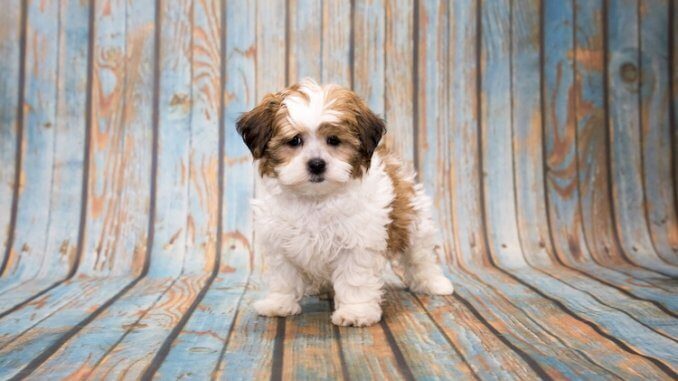
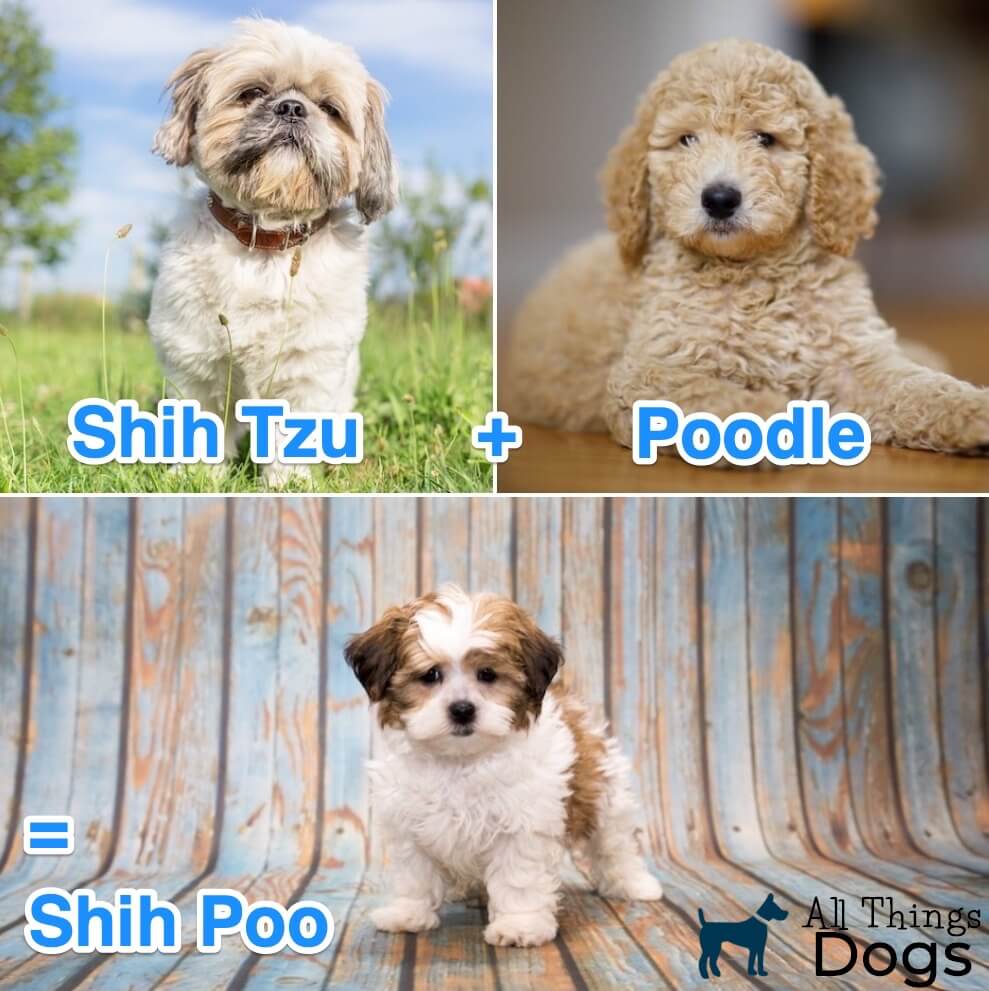
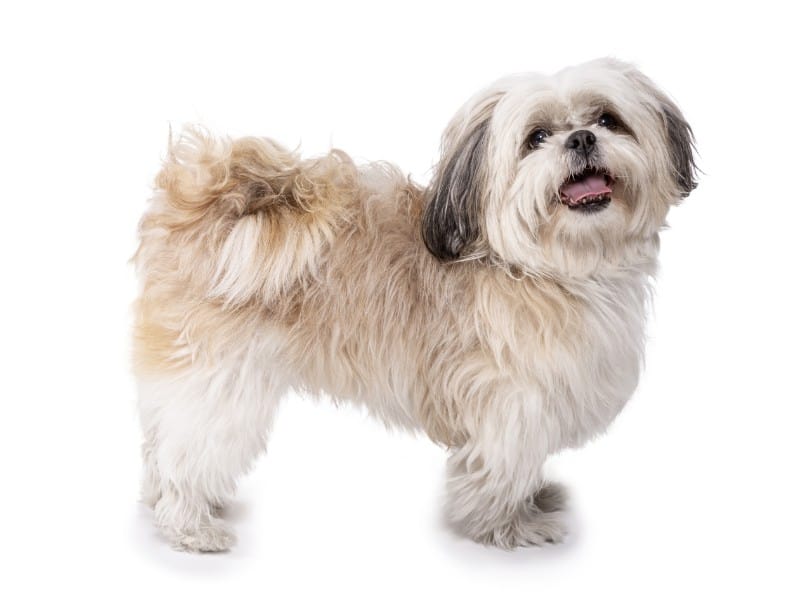
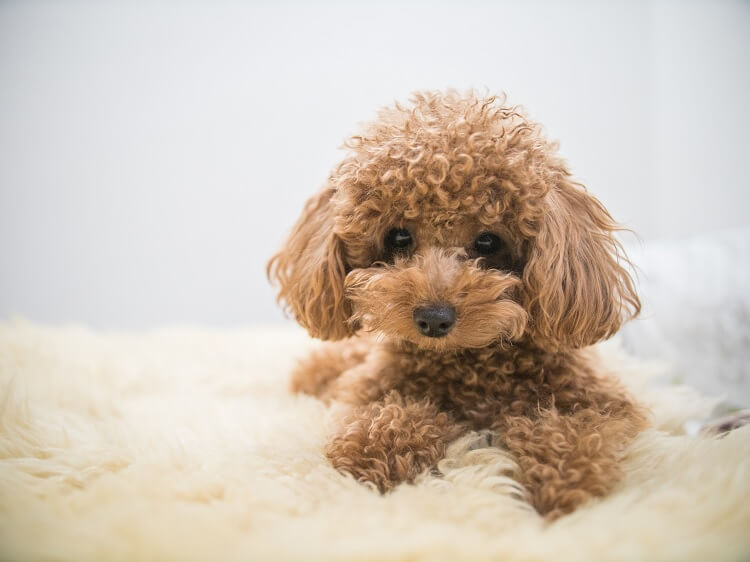
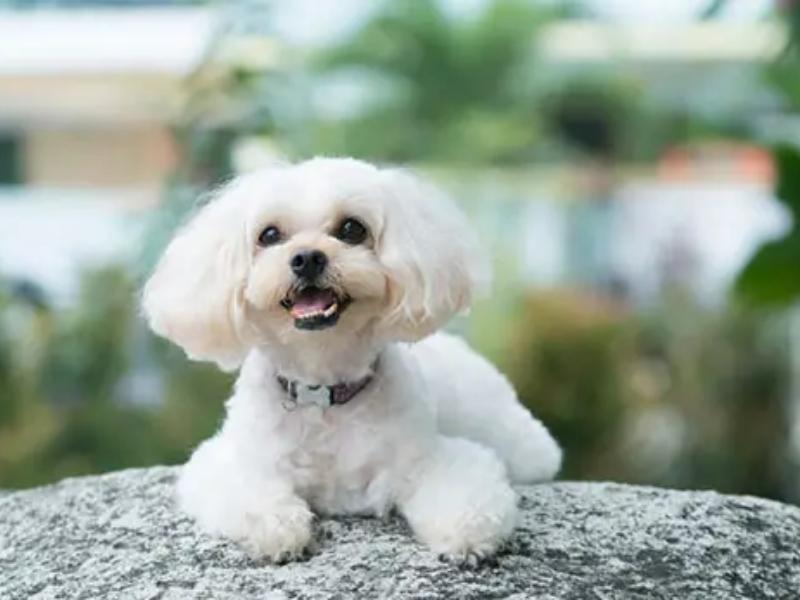
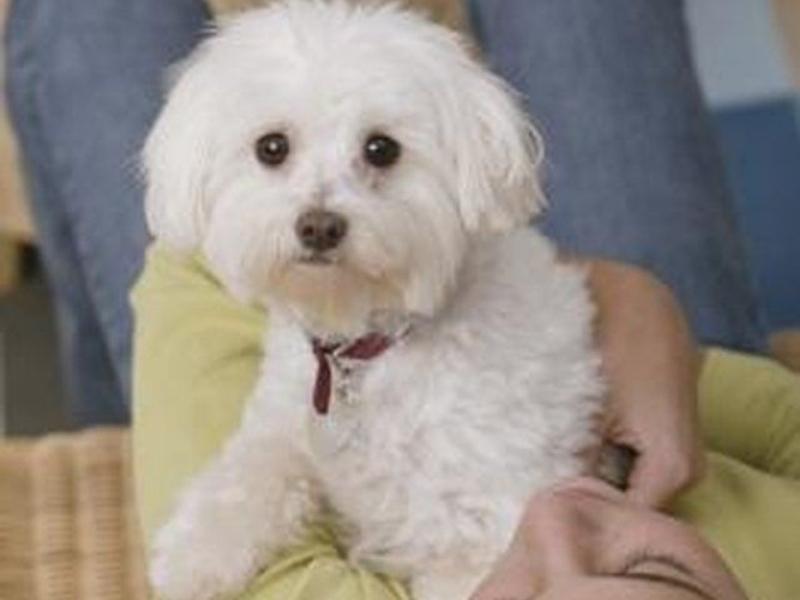
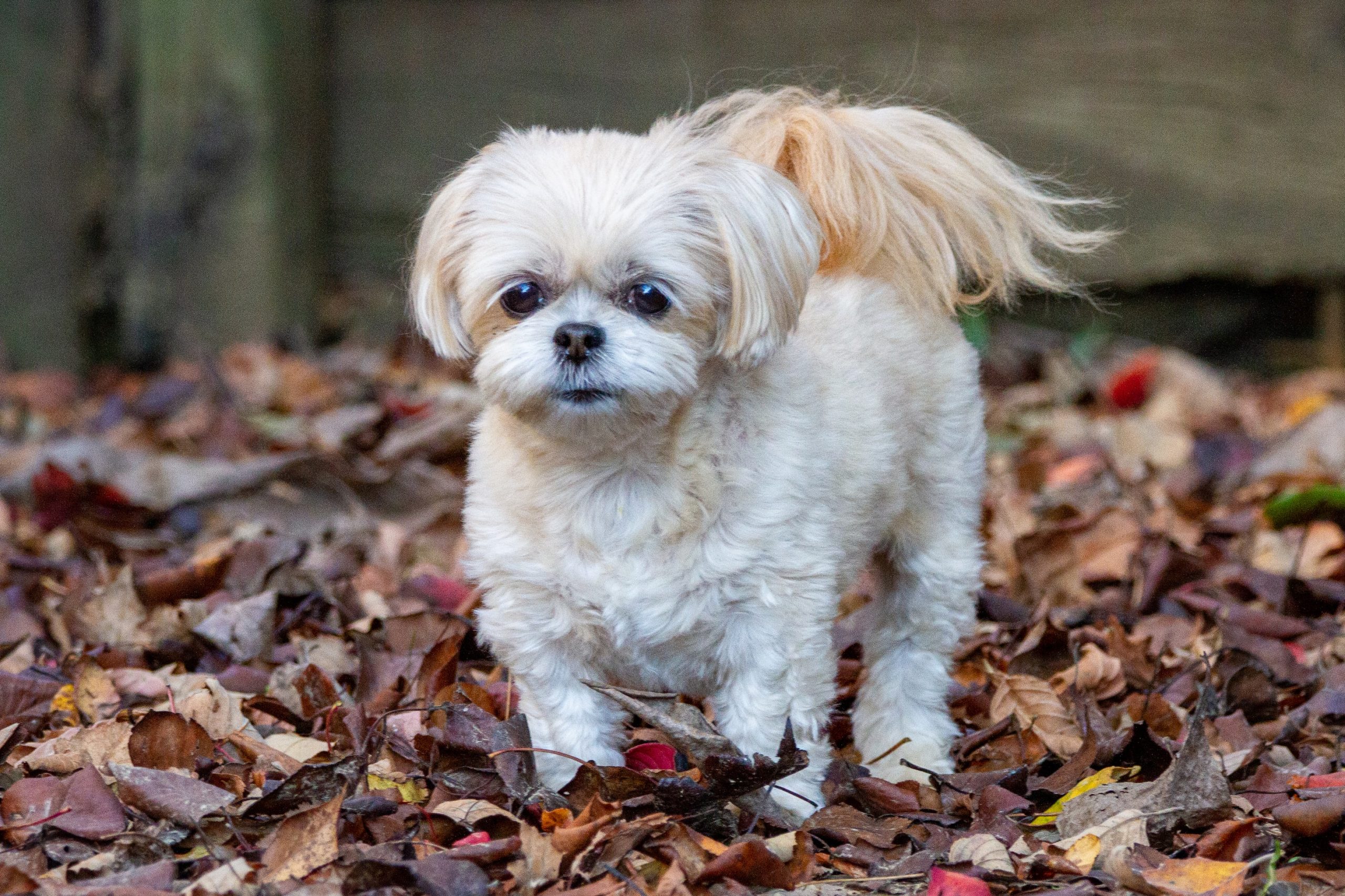

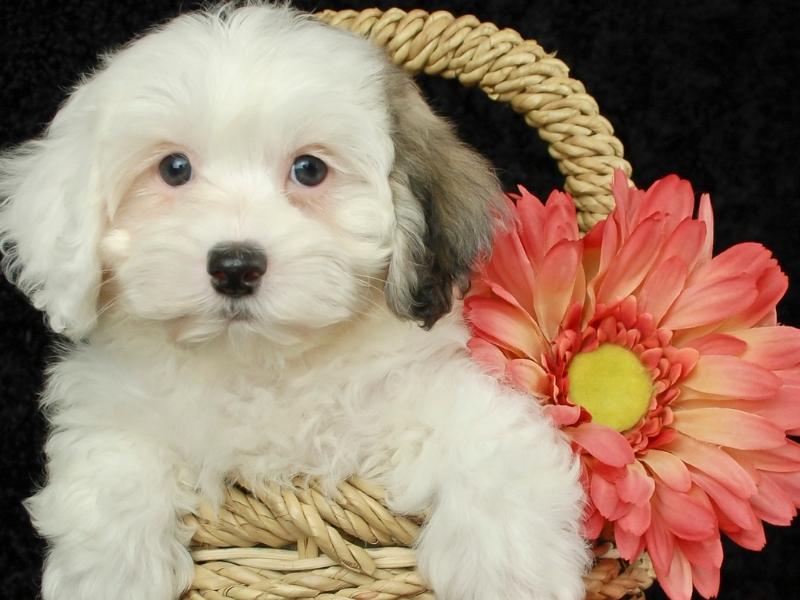
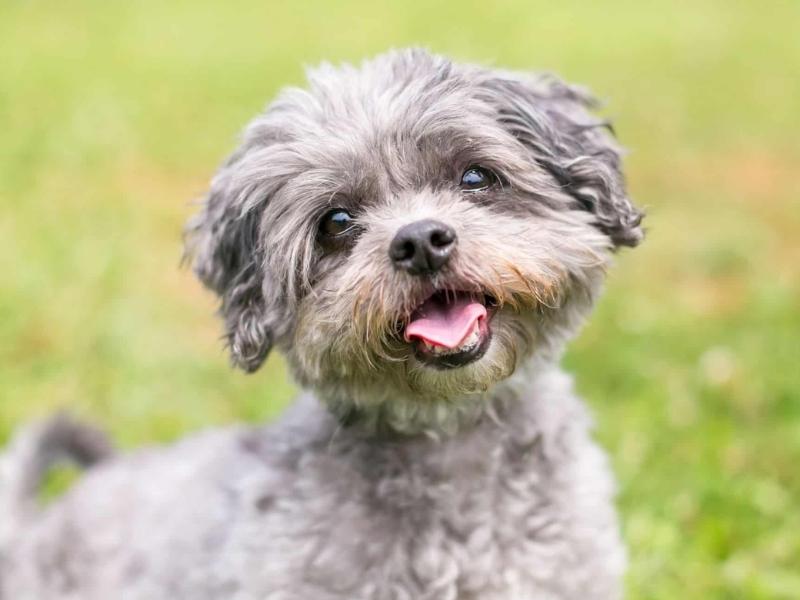


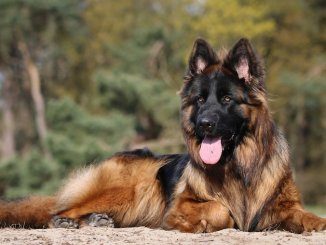

I am waiting to pick out my shih poo puppy when they are ready for adoption. Would it be a good decision (for the dog) if I picked two shih poos? Would they be happy to have a playmate or are they better off alone?
Whether you decide to take two dogs on is entirely personal choice. Do you have the time and resources to raise them separately as well as together? By this I mean, can you train and walk them separately as well as together? They both need the time and attention that they would get if they lived individually in separate homes. Research the idea of littermate syndrome. Some dogs can get super dependent on each other, which becomes an issue if they ever need to be separate (for vet attention for example). Like any owner taking on more than one dog, you also assume that they will get on. They may not. What would be your plan if they didn’t?
My Shihpoo, Sofie, and her “it’s all about me” personality, home at 6 weeks old. She’s very loving, affectionate and eager to please. Sofie is very smart and she had potty pad training “mastered” at 10 weeks. She is working on leash training & basic commands and doing well. When Sofie’s the center of attention, she’s happy and obedient. If there’s something that needs my attention, even momentarily, she’ll make her displeasure known, either by not using the potty pads or chewing on my shoe. Both of which she knows is unacceptable. That would be my only “issue” at this point.
I just got a shih poo for my children for Xmas which I will give them on Xmas. He is 8 weeks any tips on training him on the pads ? I have 4 children and hope snoopy ( the shih poo can catch on fast ) maybe potty train him n my 1 year old together lol 😆 .
We recently lost our beloved Shihpoo furry baby at 14. He was the best dog with such an adaptable personality. Loving and easy going and intelligent with a such a huge heart for grandkid visits. Selecting this breed was the most rewarding thing we ever did.
Best dog I have had in my almost 50 years.
Always find myself downplaying his smarts to others as “must be the poodle in him”. As spoiled as the dog is by a family of four, he might be emotionally devastated if he had another dog around permanently.
This article was spot on in regards to my Shihpoo and thank you for the heads up about brushing his teeth 😉 😉
We adopted our dog 3 years ago (she was 9 months). I just had her DNA done. Found out she’s a Shihpoo. She’s our first dog and it was love at first sight. We love her so much and she’s a wonderful dog. We couldn’t ask for anything better.
Our sweet puppy is now 8 months old. He’s the most adorable, intelligent, loving and caring dog. He’s brings so much joy and positive emotions in our home. I very often find myself thanking God for bringing him to us.
The article is so accurate. There is only one thing – they can be extremely intelligent and many puzzles for dogs get cracked on the first play.
I have a 1 1/2 year old shih poo. He is the best!!! He has separation anxiety every time I leave the house. Usually I take him everywhere with me to socialize, he love kids, people and others dogs. My groomer thinks that it might help if I got him a friend (another dog). Suggestions on this?
I have a chocolate shipoo (Hershey) he is 9 months and just finish his puppy training. He is a joy and full of life and energy, but loves to tug at your pants leg still, I believe he is still on the backend of teething, other than that he loves being outside and going for walk and playing with the other small breed dogs in the community.
I have a Shipoo! The breeder maintained she was ShihTzu. After a year I contacted the breeder and she admitted there was a poodle grandparent. My guess is she is 50/50. Everything I have read about the ShihPoo is her. Her looks and temperament are as described in this article. She is highly devoted to me and I am her first choice, as she sleeps and doesn’t leave me. I thought I wanted a purebred ShihTzu but I wouldn’t trade her in. We love her and she loves us.
Shi Poo Breeder
Shi Poo Breeder and Malteses Shizu Breeder